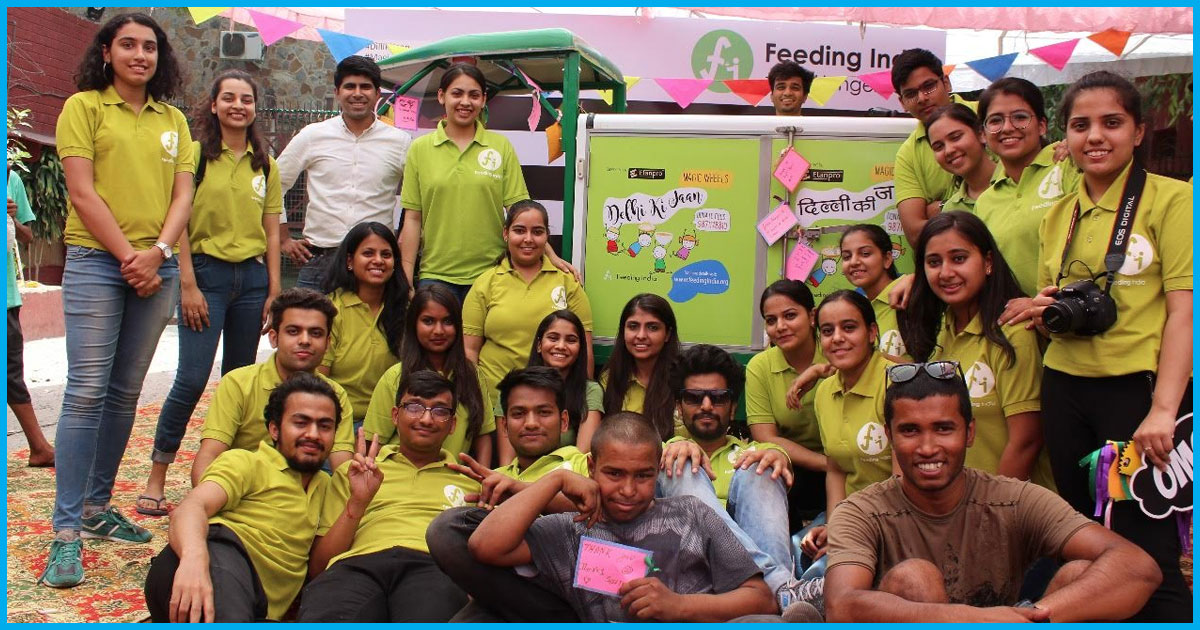
Delhi NGO Launches E-Vehicle To Redistribute Leftover Food To The Needy
29 May 2018 1:31 PM GMT
Editor : Sromona Bhattacharyya
Hailing from Kolkata and now a resident of Bengaluru, Sromona is a multimedia journalist who has a knack for digging stories that truly deserve attention.
India ranks a dismal 100 out of 119 countries in the Global Hunger Index, and while that number continues to astonish the lot of us, it is no secret that food worth crores of rupees is wasted everyday in India.
To help combat the ever-increasing problem of food accessibility in India and minimise food wastage, a Delhi-based NGO, Feeding India has come up with an e-vehicle which seeks to redistribute food free of cost, to those who need it the most.
The electric vehicle dubbed as “Dilli Ki Jaan” was unveiled on May 28 which is also World Hunger Day.
Srishti Jain, Co-founder of Feeding India, while talking to The Logical Indian has said that the goal is to eliminate global hunger by using food as an incentive for those in need. “This e-vehicle is the fist of its kind in India. It will not only redistribute food free of cost, but reduce our carbon footprint as well,” added Jain.
Feeding India picks up leftover food from restaurants, marriage parties, households and events, just to redistribute it to different shelters with children, elderly persons and special needs people.
The e-vehicle is fitted with a 9,000 refrigerated storage box. The NGO envisages to redistribute about 800 meals in a day.
Even though the truck will now operate at a restricted zone in Delhi, the founders are hoping to extend it to a pan India level in the future.
The Logical Indian Take
According to the World Bank’s 2016 data, 1 in every 5 Indians is poor, and the 7 poorest states – Uttar Pradesh, Bihar, Madhya Pradesh, Odisha, Jharkhand, Rajasthan and Chhattisgarh – house 62% of the country’s poor. Unemployment in these regions is high, hence, the lack of funds to sustain life. While in our urban bubbles, we hardly realise the plight of more than half of our country’s population.
Food security in India is clearly alarming. Defined by the World Health Organisation (WHO) as a “situation when all people at all times have physical and economic access to sufficient and nutritious food that meets their dietary needs and food preferences for an active and healthy life”, India’s 2017 GHI ranking points at a situation fraught with despair.
For every Indian to be able to feed themselves, food needs to be available, accessible and affordable. Availability suffers due to corruption and bureaucracy, while accessibility and affordability are hampered due to the existing inequality.
In 2013, the Indian Parliament signed the National Food Security Act or the Right to Food Act, which, includes the midday meal scheme, Integrated Child Development Services scheme and the Public Distribution System. The gross incompetence to properly implement these schemes are not unknown – children have lost lives due to the consumption of unhygienic midday meals, their ration is sometimes lost in transit and public distribution systems are rigged.
Presently, India has pitched for a permanent solution to its food security issue. Commerce and Industry Minister, Suresh Prabhu, at an informal gathering at the World Trade Organisation, said on October 12 that this is of “tremendous importance” to the country.
As mandated in the UN Sustainable Development Goal 2, Prabhu expressed his determination to end world hunger by 2030, when we have dropped three places in the Global Hunger Index in one year.
India has also been working closely with the UN Food and Agricultural Organisation (FAO) to address the issues of the poorer communities and gain technical assistance. However, any change will only see the light of the day when the bureaucracy is uncorrupted and citizens’ basic needs are secured. We cannot expect the country to progress when children, the future of our nation, are dying of hunger.
In the wake of such alarming numbers, The Logical Indian commends Feeding India’s efforts to diminish hunger in the country.
 All section
All section


















